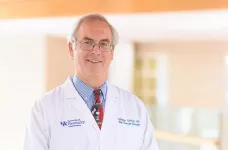(Press-News.org) A novel molecular pathway to explain how a mutation in the gene ACTA2 can cause individuals in their 30s – with normal cholesterol levels and no other risk factors — to develop coronary artery disease has been identified, according to researchers with UTHealth Houston.
The study was published in the European Heart Journal.
“The gene ACTA2 codes a specific protein that has nothing to do with cholesterol,” said Dianna Milewicz, MD, PhD, senior author of the study and professor and director of the Division of Medical Genetics at McGovern Medical School at UTHealth Houston. “It was a surprise to find that people with the gene mutation had too much atherosclerosis at a young age and with no risk factors.”
A 2009 study led by Milewicz found that a number of mutations in ACTA2 predispose humans to develop early onset (30s or younger) coronary artery disease.
Atherosclerosis is a buildup of fats, cholesterol, and other substances in and on the artery walls. It can develop over time and most people don’t know they have it until they suffer a heart attack or stroke. Traditional risk factors for developing atherosclerosis include high cholesterol, high blood pressure, diabetes, smoking, obesity, lack of exercise, and consuming a high-fat diet.
ACTA2 is typically found in the smooth muscle cells, which line the arteries and allow the arteries to contract to control blood pressure and flow. Milewicz and her team found that protein coded by this gene is not folded correctly because of the mutation, and it triggers stress in the smooth muscle cell, which then forces the cell to make more cholesterol internally, regardless of the levels of cholesterol in the blood, driving atherosclerotic plaque formation.
“This finding is unique in that we found a completely new pathway to atherosclerosis. It explains why for years we have known statins protect people from heart attacks, even those people whose blood cholesterol levels are normal. In the people with ACTA2 mutations, the statins block the cholesterol made by the stressed smooth muscle cells,” said Milewicz, the President George Bush Chair in Cardiovascular Medicine with McGovern Medical School. “In our study, the mutant protein made by the ACTA2 mutation caused the cells in the artery wall to be stressed, but there are many other factors that can stress cells. We are now working on the risk factors for coronary artery disease, like hypertension, that would also stress the cells and activate this novel pathway for coronary artery disease.”
One of the results of stress in smooth muscle cells associated with atherosclerosis is the deposition of calcium in the arteries.
“Cardiac calcium imaging in individuals with ACTA2 mutations could be a useful early diagnostic tool to monitor the development of the early atherosclerosis in these people. This would allow physicians to decide at what age to start these patients on statins,” Milewicz said.
Using a genetically engineered mouse that contains a particular ACTA2 mutation and feeding the mice a diet rich in cholesterol, the researchers induced atherosclerosis and found that these mice have much more atherosclerosis than similarly treated mice normal mice. The study also found that the increased atherosclerosis could be reversed by treating the mice with pravastatin, a member of the statin group of drugs commonly prescribed to lower blood cholesterol. The researchers confirmed that same molecular pathway is activated in smooth muscles cells isolated from a human patient with an ACTA2 mutation.
Statins prevent coronary artery disease by lowering the levels of cholesterol in the blood. At the same time, more than half of heart attacks occur in apparently healthy men and women with average or low levels of plasma LDL-cholesterol. Statins also reduce heart attack events in people with normal cholesterol levels.
This work was supported by the National Heart, Lung, and Blood Institute (RO1 HL146583); an America Heart Association Merit Award, NIH T32GM120011; Marfan Foundation McKusick Fellowship Award; and American Heart Association Grant 20CDA35310689. Lipid profile analysis was performed at the Mouse Metabolism and Phenotypic Core at Baylor College of Medicine, funded by NIH RO1DK114356 and UM1HG006348. Single cell RNA sequencing was performed at the Single Cell Genomics Core at Baylor College of Medicine, funded by National Institutes of Health shared instrument grants S10OD023469, S10OD025240 and P30EY002520.
Additional UTHealth Houston authors include Kaveeta Kaw, MD, PhD; Abhijnan Chattopadhyay, PhD; Pujun Guan, MM; Jiyuan Chen, PhD; Suravi Majumder, PhD; Xue-yan Duan, PhD, and Callie S. Kwartler, PhD. Other authors include Shuangtao Ma, MD, MSc, with Michigan State University College of Human Medicine (a former postdoctoral fellow at UTHealth Houston) and Chen Zhang, MD, with Baylor College of Medicine.
Media Inquiries: 713-500-3030
END
Researchers uncover how a genetic mutation can cause individuals with normal cholesterol levels to develop coronary artery disease at a young age
2023-07-07
ELSE PRESS RELEASES FROM THIS DATE:
Pain risk varies significantly across states
2023-07-07
BUFFALO, N.Y. – The prevalence of moderate or severe joint pain due to arthritis varies strikingly across American states, ranging from 6.9% of the population in Minnesota to 23.1% in West Virginia, according to a new study led by a University at Buffalo researcher.
The paper published in the journal PAIN is providing new insights − through its novel combination of individual- and macro-level measures − into geographic differences in pain and their causes.
“The risk of joint pain is over three times higher in some states compared to others, with states in the South, ...
The American Society for Nutrition appoints Steven A. Abrams, MD as Next Editor-in-Chief of Advances in Nutrition
2023-07-07
Rockville, MD (July 7, 2023) – Steven A. Abrams, MD, Professor in the Department of Pediatrics at the University of Texas at Austin Dell Medical School has been named the next Editor-in-Chief of Advances in Nutrition. Dr. Abrams is a globally recognized leader in pediatric nutrition whose scientific contributions have helped establish the evidence base on nutrient requirements in infancy, childhood, and adolescence.
Advances in Nutrition is the American Society for Nutrition’s journal that publishes reviews spanning basic, translational, ...
New study suggests blood plasma proteins hold answers to better understanding long COVID
2023-07-07
LONDON, ON – Recently published in The Journal of Translational Medicine, a team at Lawson Health Research Institute has discovered unique patterns of blood plasma proteins in patients with long COVID that could reveal potential drug targets to improve patient outcomes.
Currently, 10-20 per cent of people with a confirmed case of COVID-19 will be diagnosed with long COVID.
“Those patients experience a wide variety of symptoms, which may include fatigue, brain fog and difficulty breathing,” says Dr. Douglas Fraser, Lawson Scientist ...
Ticks may be able to spread chronic wasting disease between Wisconsin deer
2023-07-07
Madison — A new study from researchers at the University of Wisconsin–Madison finds that ticks can harbor transmissible amounts of the protein particle that causes Chronic Wasting Disease (CWD), implicating the parasites as possible agents in the disease’s spread between deer in Wisconsin. Her findings were published in the journal Nature.
CWD is caused by a pathogenic agent called a prion, which can pass from deer-to-deer through contact with things like prion-contaminated soil and infected ...
Doom-and-gloom climate news may scare but also encourage audiences
2023-07-07
UNIVERSITY PARK, Pa. — A team of Penn State researchers investigated how seeing frightening news about climate change day after day may shape the way people feel about the phenomenon and how willing they are to take action to address it.
Christofer Skurka, Jessica Myrick and graduate student Yin Yang found that seeing bad news about climate change can make people more afraid over time, but it also may encourage audiences to think about what society can do to address the problem. They published the results of two separate studies in an article titled “Fanning the flames or burning out? Testing competing hypotheses ...
Name of Portuguese astrophysicist shines in the night sky
2023-07-07
The International Astronomical Union (IAU) has named an asteroid after Pedro Machado, astrophysicist at Institute of Astrophysics and Space Sciences (IA), at the Faculty of Sciences of the University of Lisbon (Portugal). Along with the nomination of Pedro Machado, there were over a hundred other nominations of asteroids and other small bodies.
It is almost three kilometers in diameter and takes four and a half years to complete its orbit around the sun. We’re talking about 2001 QL160, or rather the asteroid 32599 Pedromachado. Pedro Machado has been honored by the Work group for the Nomenclature of Small Bodies (WGSBN 2) of the International Astronomical ...
Charles 'Chipper' Griffith named dean of UK College of Medicine
2023-07-07
LEXINGTON, Ky. (July 6, 2023) — Charles “Chipper” Griffith III, M.D., has been named dean of the University of Kentucky College of Medicine.
Pending approval from the Board of Trustees, Griffith will begin his appointment July 15, 2023. He has served as acting dean of the college since July 2021.
Through the years, he has played an instrumental role in the health and well-being of Kentuckians, and in the academic success of thousands of students.
“Dr. Griffith understands Kentucky needs the UK College of Medicine,” said Provost Robert ...
Updating pulse oximeters
2023-07-07
Updating pulse oximeters
A portable device used to detect blood oxygen levels revolutionized the medical field 50 years ago and is now receiving essential updates
Efforts to improve the accuracy of pulse oximetry readings for diverse groups of patients and in multiple settings are underway. Joel Moss, M.D., Ph.D., a senior investigator in NHLBI’s Laboratory of Translational Research, and Bennett Yang, a postbaccalaureate fellow in Dr. Moss’s lab, describe this process and the future of pulse oximetry research.
Q: Why are portable pulse ...
July issues of American Psychiatric Association journals cover advances in social determinants of mental health, youth mental health screening, AI in psychotherapy and more
2023-07-07
The latest issues of three of the American Psychiatric Association’s journals, The American Journal of Psychiatry, Psychiatric Services and The American Journal of Psychotherapy are now available online.
The July issue of The American Journal of Psychiatry features articles on social determinants of health relevant to racial and ethnic disparities as well as postmortem molecular studies. Highlights include:
Recent Advances on Social Determinants of Mental Health: Looking Fast Forward.
Differences in Social Determinants of Health Underlie Racial/Ethnic Disparities in Psychological Health and Well-Being: Study of 11,143 Older Adults.
The Nature ...
Breakthrough identifies new state of topological quantum matter
2023-07-07
ITHACA, N.Y. -- Cornell scientists have revealed a new phase of matter in candidate topological superconductors that could have significant consequences for condensed matter physics and for the field of quantum computing and spintronics.
Researchers at the Macroscopic Quantum Matter Group at Cornell have discovered and visualized a crystalline yet superconducting state in a new and unusual superconductor, Uranium Ditelluride (UTe2), using one of the world’s most powerful millikelvin Scanned Josephson Tunnelling Microscopes (SJTM). This “spin-triplet electron-pair crystal” is a previously unknown state of topological quantum matter.
The findings, ...


